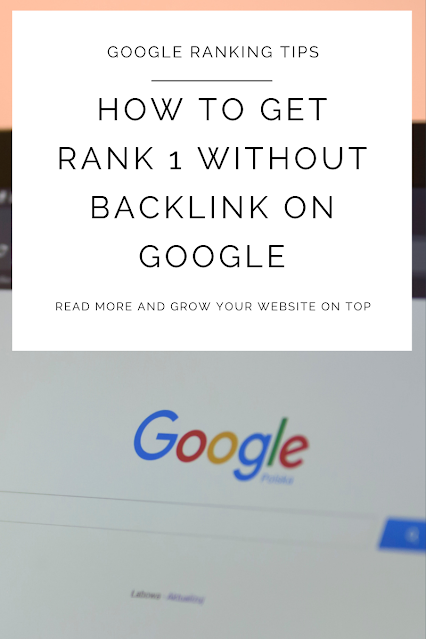How to get 1 rank without backlinks on Google :
Are you wondering how to get the coveted 1st rank on Google? Achieving a high ranking on the search engine results page (SERP) is a goal many strive for. While backlinks have long been considered a crucial ranking factor, there are ways to rank without solely relying on them. In this article, we will explore 17 proven strategies to improve your website's ranking on Google, including how to get 1 rank and rank without backlinks. Whether you're a beginner or an experienced SEO practitioner, these strategies will empower you to optimize your website, attract organic traffic, and climb the Google rankings. Let's dive in and discover the path to higher visibility and success.
Ranking higher on Google is a crucial goal for businesses and individuals alike. It not only drives more traffic to your website but also boosts your online visibility and credibility. In this article, we will explore 14 proven strategies to help you achieve a higher rank on Google. These strategies are divided into three tiers: basics, details, and advanced techniques. Whether you're a beginner or a seasoned SEO practitioner, these tips will empower you to optimize your website and help you get 1 rank on Google without backlinks.
Tier 1: Basics
1. Target Reasonable Keywords:
- Conduct thorough keyword research to identify relevant keywords with suitable search volume and competition.
- Consider factors such as domain authority and keyword relevance to choose the most effective keywords.
2. Understand Keyword Intent:
- Determine the intent behind the keywords you target: informational, commercial, transactional, or navigational.
- Align your content with the specific intent to improve your chances of ranking effectively.
3. Create Long-Form Content:
- Develop comprehensive, valuable content that revolves around your target keywords.
- Ensure your content provides in-depth information, avoiding thin or shallow material.
4. Optimize On-Page SEO:
- Pay attention to crucial on-page SEO elements, including keyword placement, internal and external linking, and meta descriptions.
- Optimize your page by incorporating target keywords in relevant areas.
Tier 2: Details
5. Target Long-Tail Question Keywords:
- Focus on long-tail keywords with question intent to capitalize on opportunities for higher rankings.
- By targeting these keywords, you may appear in the "People Also Ask" section, outranking broader keyword results.
6. Enhance Skimmability:
- Optimize your content to be easily skimmed by users and search engines.
- Utilize headings, lists, bullets, boldface, and other formatting techniques to make your content more scannable.
7. Provide Explicit Answers:
- When targeting question keywords, explicitly answer the question within your content.
- Restate the question and provide a clear, concise answer to increase your chances of appearing in featured snippets.
8. Incorporate Meaningful Visuals:
Include relevant and engaging visuals in your content to enhance user engagement.
Align your visuals with the intent of the targeted keyword and increase your chances of appearing in image results.
Align your visuals with the intent of the targeted keyword and increase your chances of appearing in image results.
9. Utilize a Table of Contents:
- Add a table of contents to your blog posts, which Google often includes in search results.
- Improve the visibility and click-through rates of your pages by providing easy navigation for users.
- Craft concise and keyword-rich meta titles that accurately represent your content.
- Stay within character limits and consider using modifiers like the year to align with popular search trends.
Tier 3: Advanced Strategies
11. Acquire Backlinks:
- You can rank without backlinks too but as to make things more precious you should also earn backlinks from other high-quality websites, as they are a significant ranking factor.
- Create valuable content and actively promote it to increase the likelihood of obtaining backlinks.
- Utilize Google Search Console to analyze the search queries that lead users to your pages.
- Identify additional headings and keywords to target based on queries driving impressions and clicks.
- Leverage the increasing prominence of videos in search results.
- Create video content targeting how-to and tutorial keywords to enhance your chances of ranking higher.
- Optimize pages that already rank on the first few pages of search results.
- Improving the ranking of an existing page is often easier than starting from scratch.
Conclusion:
These 14 strategies will empower you to enhance your website's ranking on Google. Remember that SEO is an ongoing process that requires continuous monitoring and adaptation to changes in search engine algorithms. By implementing these techniques, you can increase your online visibility, attract more organic traffic, and establish your website as a credible source within your industry.


Comments
Post a Comment